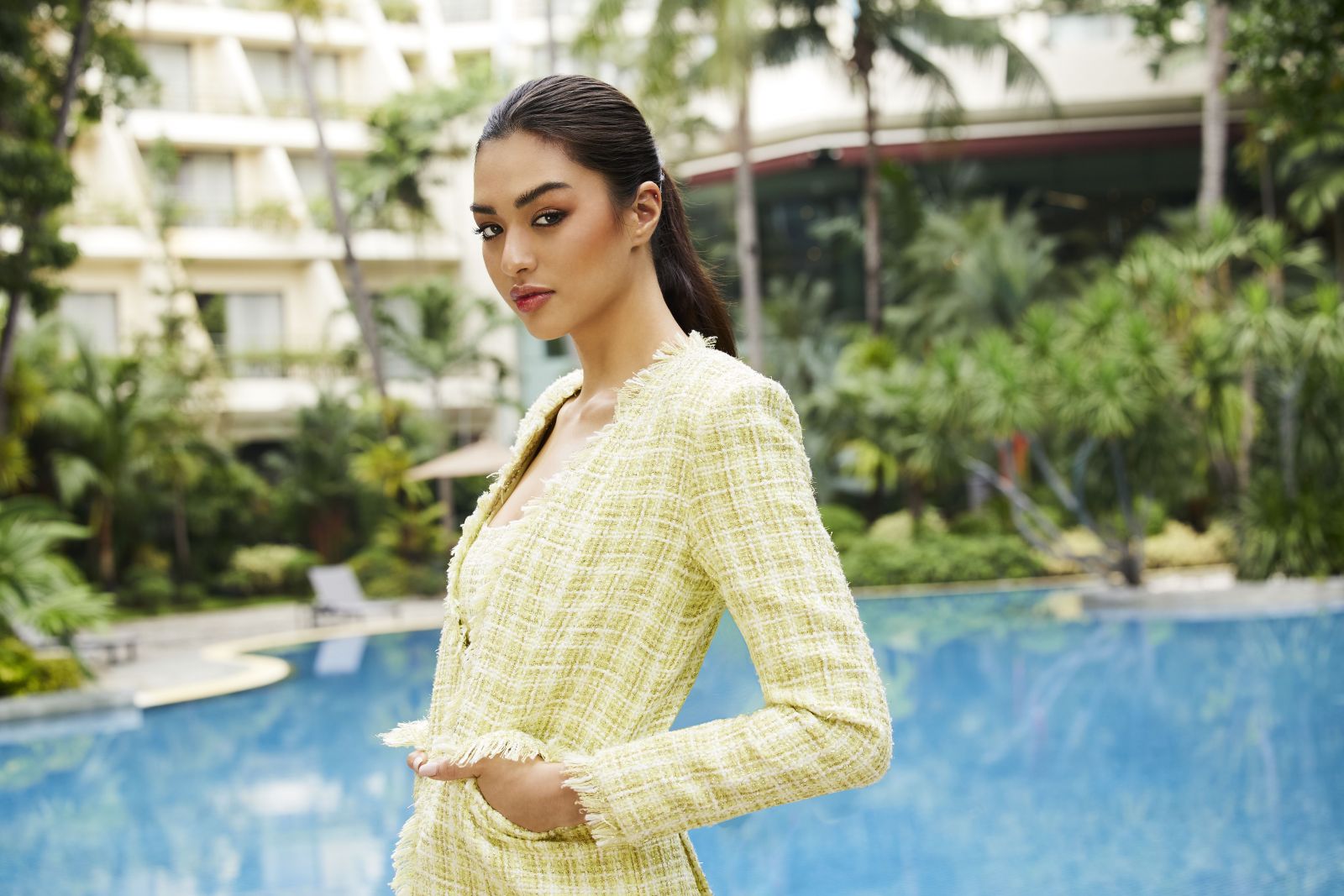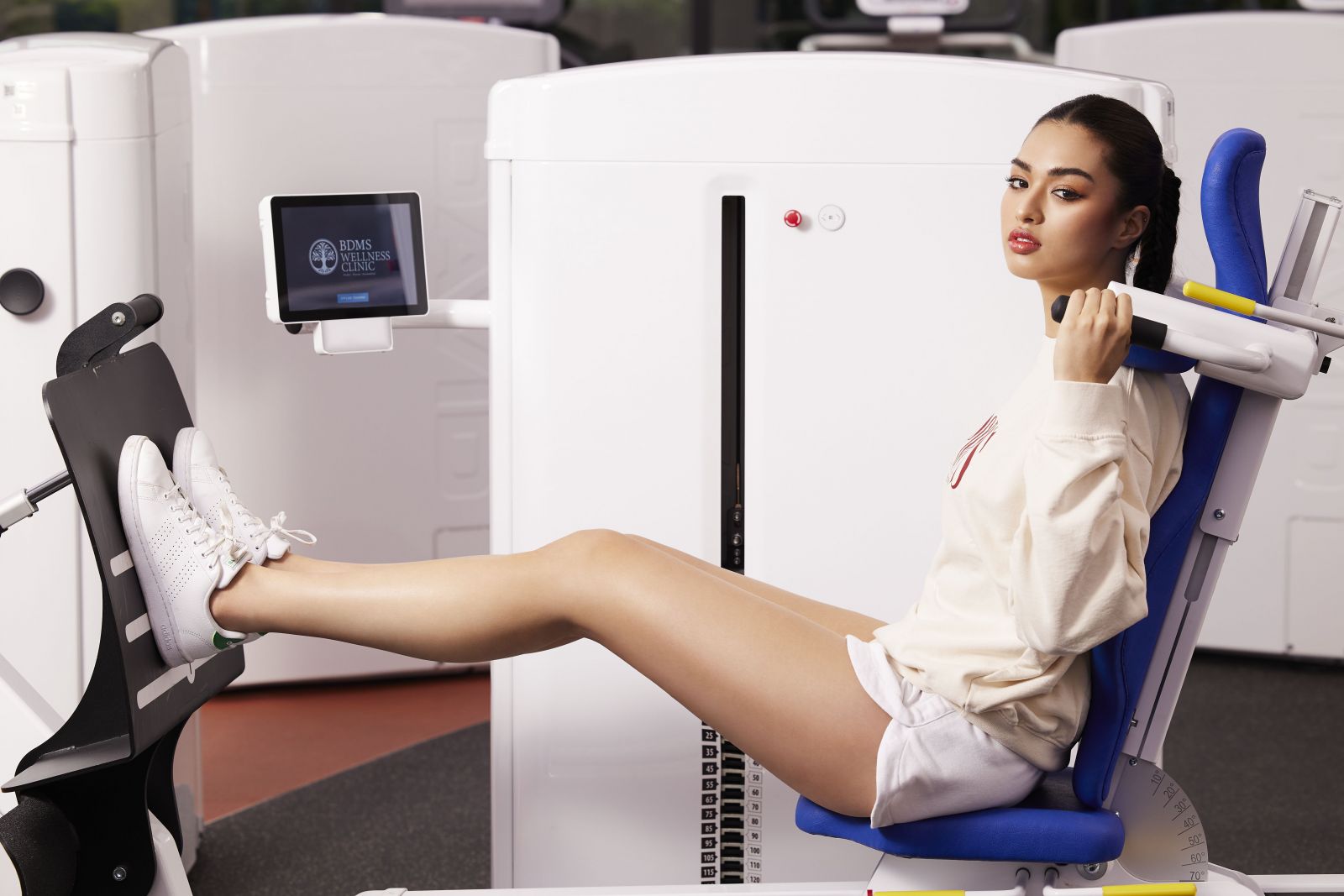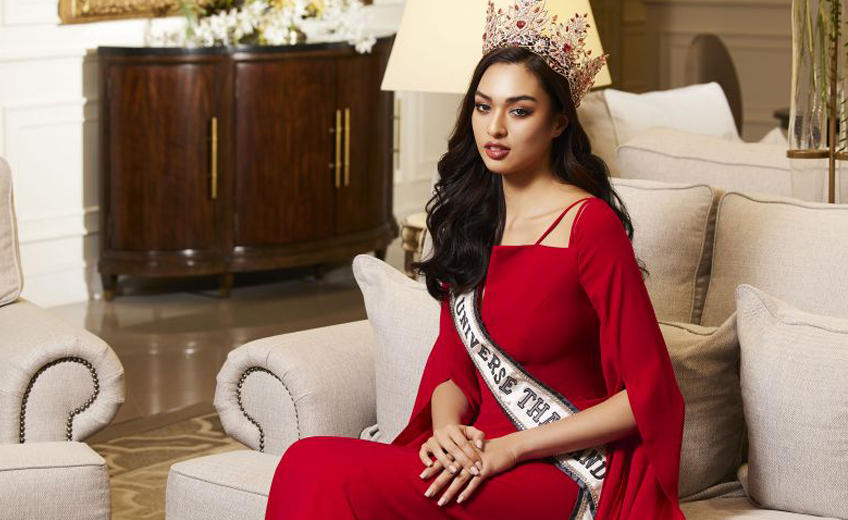Anchilee, or Anne, Scott-Kemmis is a beautiful, modern, young Bangkok woman with roots in rural Chachoengsao and Australia, the birthplaces of her parents. On 24 October 2021, Anne was crowned Miss Universe Thailand at the 22nd Miss Universe Pageant held at NICE of the Nong Nooch Tropical Garden in Pattaya. In December, she will travel to Eilat, Israel where she will compete for the Miss Universe Crown with as many as 77 contestants representing countries and territories from around the world.
Since being crowned, Anne has been extremely busy preparing for this global competition as well as assuming the new obligations and responsibilities as this year’s winner. Elite+ was very fortunate to have the chance to meet and interview Anne at the BDMS Wellness Clinic during a photo shoot. We began our interview talking about Anne’s early years and people that have influenced her.
Some articles have claimed that you are from Chachoengsao, but it seems you were born and brought up in Bangkok.
Yes, my parents were already settled in the city and working. They felt that Bangkok offered the best opportunities, but my grandmother lived in Chachoengsao, and every Sunday while she was alive, we would go to visit her. Her home was quite rural. There was a lot of grassland and paddy fields and a lot of canals. Life there was quite basic and very hands-on. It was really fun and I loved getting messy.
As a Bangkok native, what do you like most about the capital and what do you miss about Chachoengsao, as it sounds like you stopped visiting the province once your grandmother passed away?
I like how liberal Bangkok is, was, well, before Covid and, I guess, once again now as restrictions are lifted. Here people are offered a flexibility to do pretty much almost anything because it is so available, right out your door. But in terms of Chachoengsao, I miss the feeling - it’s almost like you don’t have a single care in the world because it’s rural; you’re more alone. There’s so much greenery. It’s just you and nature.
_1794099225.jpg)
You know the last Miss Universe from Thailand, Bui Simon, or Porntip Nakhirunkanok, was from Chachoengsao. Was she an inspiration for you in anyway or who else would you say has been an important inspiration for you?
To an extent she was influential. I think having the commonality of being Thai and representing Thailand on an international stage naturally has had an influence on me, especially since I have chosen to work in this field. But if we’re talking about my biggest inspiration, I always look to my dad, how he carries himself and how still and poised he always appears to be, but at the same time very approachable. So, he is someone I have always looked up to and someone I’ve always wanted to emulate.
You are a graduate of NIST International School. Can you tell us what you liked most about this school?
I liked that the students were encouraged to express their opinions and unapologetically. Students did not feel afraid to voice their viewpoints as the school really pushed critical thinking which allowed for a lot of debate. This provided us with a lot of different perspectives that would be shared, which then widened our understandings and led us to be a lot more open minded. How do you think NIST prepared you for the future? I owe a lot to my school. I think NIST really makes a student a well-rounded person. In addition to academics, they encourage participation in sports and community service. Being surrounded by people from all sorts of different backgrounds, without realizing it, students tend to borrow or adopt different aspects, especially the positive ones of the different cultures, and I think this has helped shape me into the person I am today.

You were the captain of the volleyball team and I think played on other teams, basketball and softball. What did you learn most as a team member and then as a captain?
I learned how to actively listen and how different people have different ways they want to be encouraged, managed even and motivated. So, I learned the power to actively listen.
I read that you said when you played volleyball, many of your teammates complained about their bodies and that you didn’t understand this. So you began to think about constructive beauty standards.
Yes, I mean when you’ve got people coming up to you and telling you how negatively they view their bodies, I felt I had a responsibility to talk to the younger generations and help them see and understand their value in ways beyond beauty standards. They are so capable but felt hindered because of their bodies and this was heart-breaking to hear. It’s something that never crossed my mind in terms of how they looked because I saw them based on their capabilities - you know what they needed to prove in terms of sports. So, when they came to me and talked about how negatively they viewed their bodies, it was just like, Wow, is this what is being valued right now when your value is so much bigger than this?
So, did you continue this thinking when you went to Australia and attended the University of Sydney where everyone, on average, is larger and you appear as more normal in size?
I didn’t think about my appearance in that way because I was part of the norm there, and so it wasn’t a problem, but I really saw how important appearance and beauty are when I came back to Thailand. My mindset had to shift in terms when receiving backhanded compliments, and I began to re-examine how these would usually come about.
Did the constructive beauty standards and these attitudes towards finding satisfaction in life inspire you to study sociology?
No, my decision to study sociology was based on the global trends and seeing how the world is constantly changing, particularly through such rapid advances in technology and more recently the adaptions that have been required to deal with the Covid-19 pandemic, which has really changed how people work and survive. So, sociology came through the understanding that the fundamentals of change are rooted in people, the need for us to exist, the need for us to exist in a community and the need for us to exist in a society. I realise that humans and societies will always need to coexist, therefore, making sociology an essential topic to study. I also think it’s kinda like a safe bet that by studying sociology, I will still be relevant 20 years from now.
How would you compare your life in Sydney to your life in Thailand?
My life here and my life in Sydney have been quite different. Sydney, for me, is a lot slower and more relaxed. Furthermore, feeling like I needed to fit in was never a thought. There is a greater sense of freedom that I felt when I was in Sydney while it feels more restrictive here. So, I have had to adopt a different persona, but I am also fortunate for this, as it has created the opportunities and passion for what I’m currently doing now.
As I understand it, after completing your studies during the Covid-19 pandemic, you decided to return to Thailand. Can you tell us why?
I actually completed my university studies in Thailand online. I only came back to Thailand because of the Covid-19 pandemic. I intended on moving back to Sydney after I completed my degree. Then, I realised there were opportunities available to me here as I was able to start modelling as a curve model. With this, I also saw the opportunity to make my voice heard and make a difference.
Before meeting the people of the Feline Agency and Khun Tin, had you considered modeling as a career?
I never considered modelling prior to meeting my team because I never wanted to change myself to fit to someone else’s beauty standards, but after meeting people who believed in me, I felt I could become an even stronger advocate for constructive beauty standards through modelling.

Today, with your line of work, do you have a diet and special fitness regime you follow or would recommend? And do you have any recommendations for persons who may want to pursue a similar career in modeling?
I don’t have a specific diet or regime; I just take care of my body and listen to what my body needs. I think the most important thing is to live a balanced lifestyle. As far as advice for those who want to pursue this career, I would say just do it and tackle it head-on.
At what point did you decide to enter the Miss Universe Thailand competition, and why?
I’ve always wanted to enter the Miss Universe Thailand pageant but never had the courage to apply because of the beauty standards they seemed to promote. But then I realised it was time to change this, and I had people who believed in me as well as me believing in myself which all together gave me the confidence to try. I also had a message and my message needed to be heard.
I also understand that you later hope to work in social development in the future, possibly for an NGO. Could you tell us a little more about this?
I admit I come from a privileged background and because of this, I want to work on social movements and with NGOs because I feel that those of us who have enjoyed a privileged life should give back in whatever way we can.
Just a few more questions. First of all, could you tell us what you do in your spare time, when you have any, for relaxation?
In my free time I like to relax by doing simple things, like watching TV, but I also really enjoy researching random topics to widen my knowledge and understanding on the world. I like to read books that are relevant and can help widen my knowledge and understanding and perception of the world. The most recent book I read is called The Fourth Turning by William Strauss and Neil Howe which offers predictions for the future of the world. I also enjoy going to the gym, but I don’t go to meet a certain weight or standards; I go to maintain my physical and mental health.
To conclude, do you have any last thoughts you would like to share with our readers?
I want to conclude by saying thank you for this opportunity and say I’m really grateful to be part of a generation that pushes for change and changes that will help our future generations to come.

























































































































































































































































































































































































































































































































































































































































































































































































































